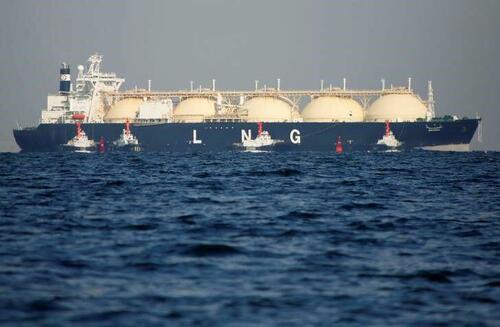Can Egypt and Israel satisfy Europe’s hunger for energy? Yes but…


While European energy markets are facing the consequences of the Russian invasion of Ukraine, Brussels appears to have realized the availability of natural gas and LNG sources on the southern shore of the Mediterranean. The Eastern Mediterranean potential, where Egypt, Israel and potentially Cyprus are in the process of building important LNG export infrastructure, has suddenly leapt onto the desks of Brussels bureaucrats and experts. After years of almost total abandonment by Europe, due to low-cost natural gas and an anti-Cairo attitude, Egypt is once again being talked about.
To boost possible LNG or natural gas deals between Egypt (East Med) and European partners, Israel is also stepping up efforts to supply volumes. The ball started after the meeting between the Israeli Minister of Energy Karine Elharrar and the European Commissioner for Energy Kadri Simson, which took place in March in Paris. After the meeting, an EU-Israel working group was created to work out a policy framework in coordination with the Egyptians to allow the flow of gas to Europe. According to Israeli sources, EU representatives have openly indicated that eastern Mediterranean gas will be needed if the EU is unwilling to allow more coal-fired electricity generation. All agreed that no other short-term suppliers are available to counter a potential freeze on Russian natural gas supplies.
Discussions between the EU and Israel include Egypt, as Cairo is the only party that actually has available export capacity. Israel and Brussels agree that exporting gas from the Eastern Mediterranean through Egyptian LNG plants in the Nile Delta (Idku-Damietta) is the only viable option at the moment. No emphasis was placed on the ongoing clamor aroused by a possible deep-sea gas pipeline to Europe, which is evidently seen as a long-term project with no real prospects for implementation.
After years in which it was avoided by most, for reasons of prices, costs or volumes, the strategic position of Egypt in the energy markets is once again recognized. Another important change, seen by the Eastern Mediterranean partners, is the drastic change of mentality within the European Union. Before the war in Ukraine and the cost of living crisis, European countries were only talking about eliminating oil, gas and coal from the energy mix. Skyrocketing energy prices and supply shortages may have triggered a change of strategy in Brussels.
For several years, Israel has been trying to gain access to the European market. In 2020, the agreement for the East Med offshore pipeline was signed, which provided for a pipeline from Israel's offshore gas fields to Greece. The project was doomed from the start, as the costs were too high, even in the current environment of high prices. One of the main financiers, the United States, has withdrawn its support since President Biden came to power. National interest in Israel in offshore gas has also waned as the new government has been reluctant to grant new licenses. Ultimately, long-term agreements are needed to make future projects viable. For Israel, the European demand for gas is important, because it not only brings additional revenue, but also opens the doors to Brussels. Israeli politicians should seek to ensure not only exports but also sufficient supplies for Israel itself for the next 30-40 years. Natural gas consumption in Israel has increased by about 1 billion cubic meters per year. In 2019, Israel consumed around 11.25 billion cubic meters. Israel is currently estimated to have around 900 billion cubic meters of proven reserves.
However, Brussels is pushing Israel and Egypt to supply additional volumes. The focus is on the available capacity and the possible expansion of the Egyptian Damietta-Idku plants. Brussels is trying to lure parts of the eastern Mediterranean by offering greater cooperation and investment in the clean energy sector as well.
In response to the Egyptian media, the Egyptian Minister of Oil and Mineral Resources Tarek El Molla said that Egyptian LNG is already satisfying some of the European demand. In an interview with Asharq Bloomberg, El Molla reiterated that East Med partners are looking to further increase supply and capacity. Additional potential natural gas supplies to Egypt's LNG plants could also come from Cyprus. The island nation plans to build infrastructure at its Aphrodite gas field. A natural gas pipeline to Egypt is expected to be operational by 2025.
Furthermore, El Molla indicated that Egypt exports around 1 29 million cubic meters / d of gas and expects this figure to grow to 42 million cubic meters / d by 2024. Currently, the total production of natural gas in Egypt is currently in the 186 and 188 cubic meters / g. The Aphrodite field is expected to contain 127 billion of natural gas, which will be mainly transported to the LNG plants of Idku and Damietta in Egypt.
One thing is clear: the fundamentals of demand are strong, prices are very attractive and E&P constraints are less. East-Med could be one of the options for diversifying the EU's energy supplies, but the geopolitical challenges remain. Continued criticism by Brussels bureaucrats or their respective European governments of the Egyptian government, led by President Sisi, represents a potential obstacle to further energy deals. In an increasingly competitive LNG and liquefied gas market, European nations should not count on the unconditional support of Egypt. It will take more than a diplomatic trip to Cairo to heal the old wounds, as we Italians know well with the Regeni case. While this will not be digestible in Brussels, they will have to put the best face on a bad situation. If we want to be the moralists of the world it is better that we also prepare ourselves not to need energy imports.

Thanks to our Telegram channel you can stay updated on the publication of new articles of Economic Scenarios.
Can Egypt and Israel satisfy Europe's hunger for energy? Yes, but… it comes from ScenariEconomici.it .
This is a machine translation of a post published on Scenari Economici at the URL https://scenarieconomici.it/egitto-e-israele-possono-soddisfare-la-fame-di-energia-europea-si-ma/ on Sun, 29 May 2022 07:51:10 +0000.
